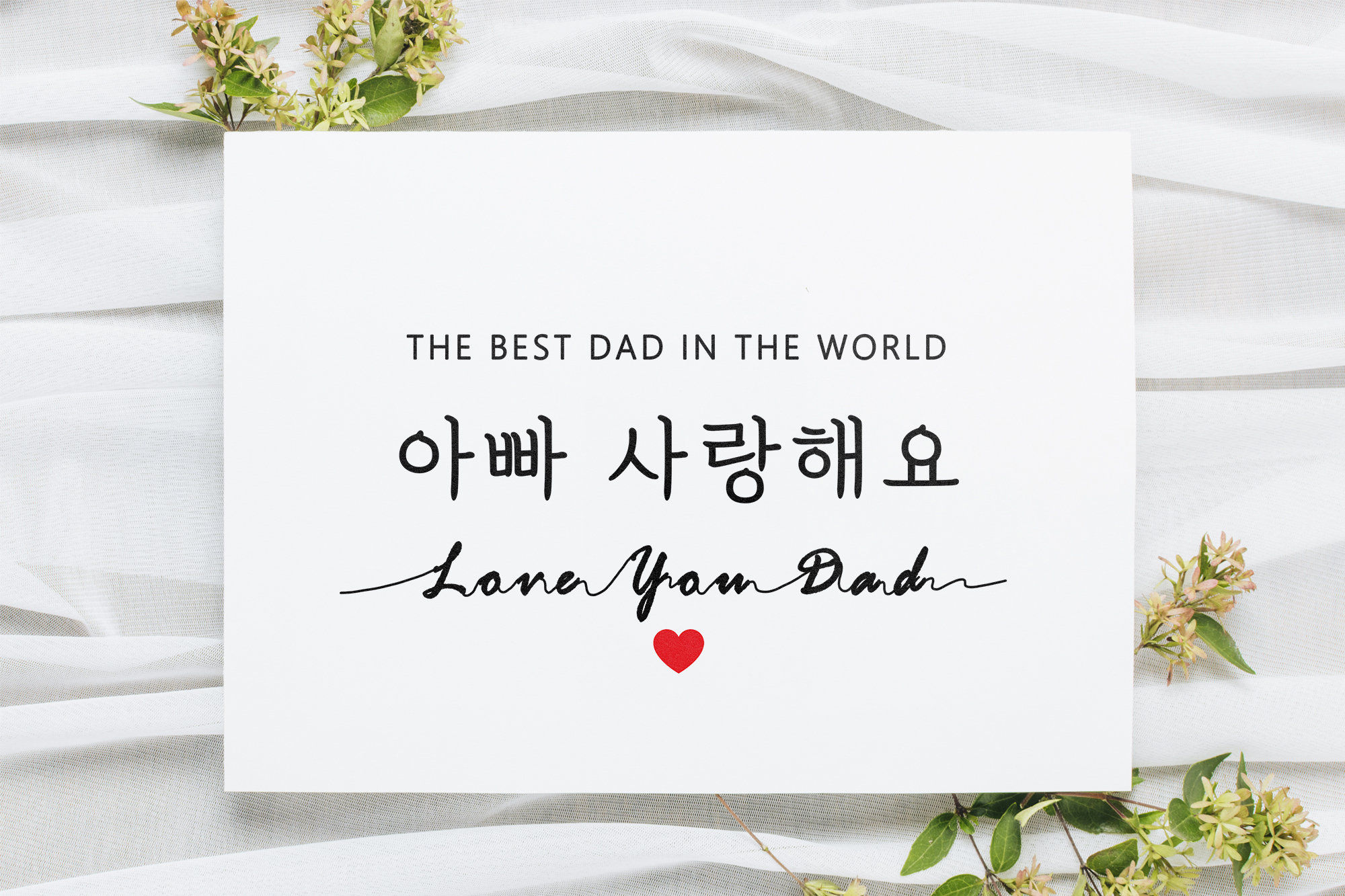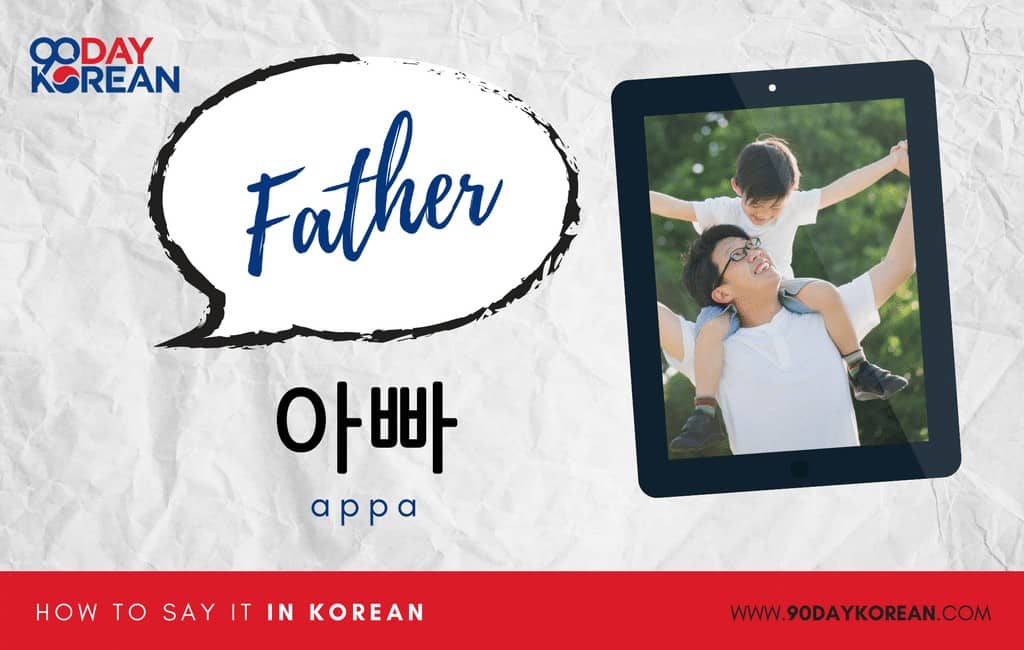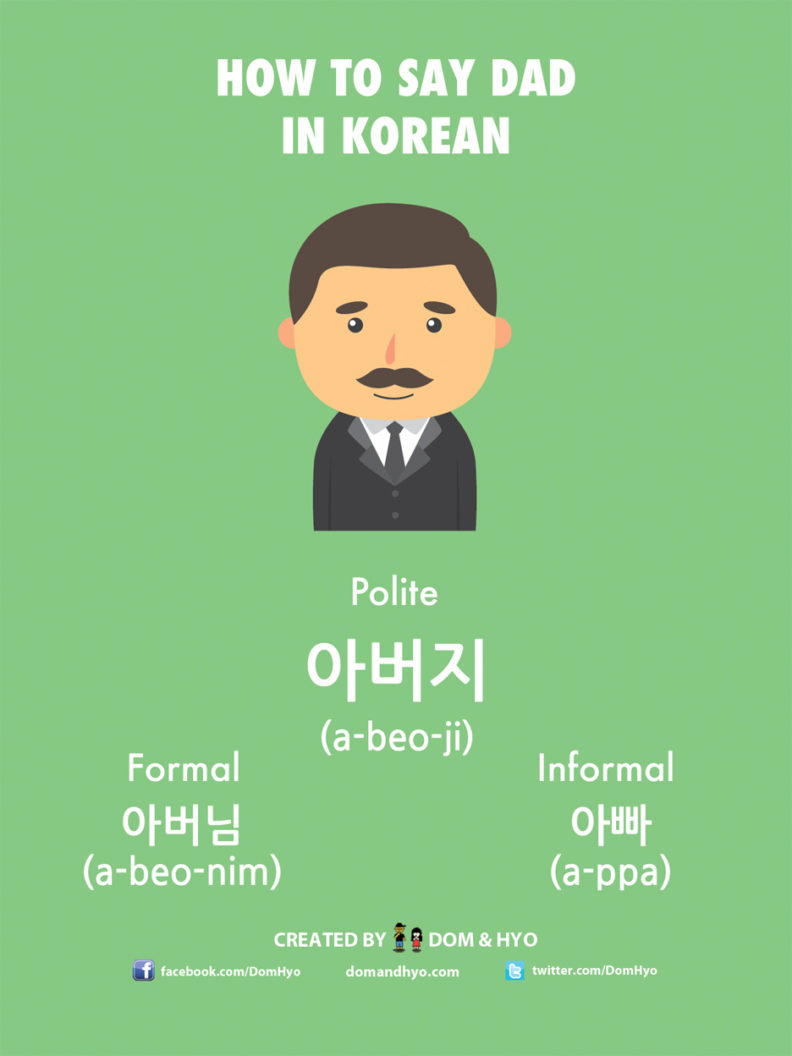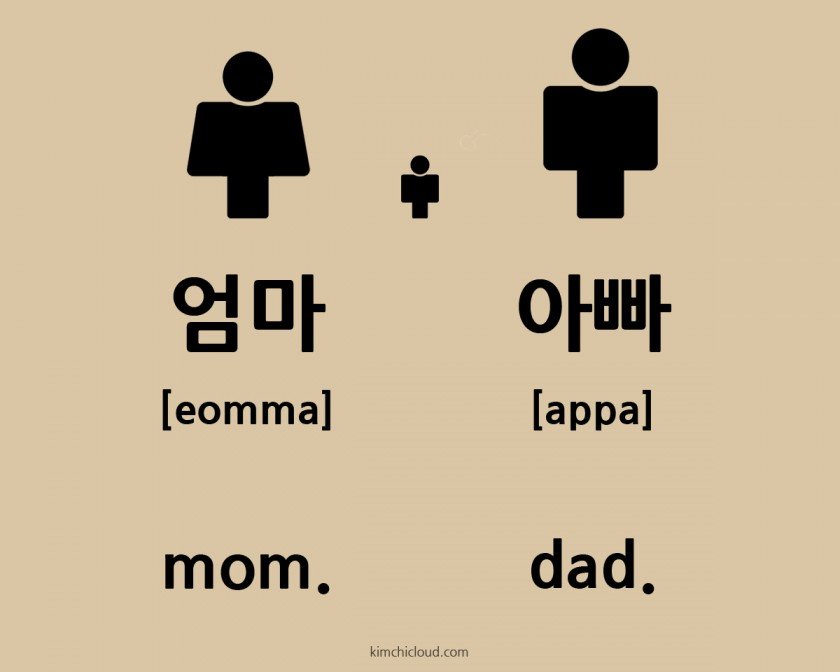
I Love You dad Korean Card / father Day Korean Card / dad card Etsy
There are three main ways to say dad in the Korean language. Let's start with the first one: 아버지 (a-beo-ji) This is the most common form you will see and use. You would call your own father by this name. However, you would never use this word for someone else's father. 아버님 (a-beo-nim) This is the formal version of the word father.

How to say Dad in Korean / 아빠 발음 YouTube
Informal 'Father' in Korean 1. 아빠 (appa) The word 아빠 has a similar meaning to 'dad' in English, and should only be used to refer to your own dad. Remember to use the word 우리, meaning 'our', instead of the word 'my' when talking about your dad. Example: 아빠가 너에게 말하지 말랬어. (appaga neoege malhaji mallaesseo.) Dad says not to tell you.

How to Say "Father" in Korean The Guide to Dad Words
Learning how to say "father" in Korean opens the doors to meaningful conversations with your Korean friends about family and cultural traditions. By understanding the different ways to address your dad, you can effectively navigate various social situations and show the appropriate level of respect. Moreover, diving into the world of.

How to Say Dad in Korean Learn Korean with Fun & Colorful
The standard word for "father" in Korean is 아버지 (abeoji). You can use this word when talking about your own father, but instead of saying "my father," you should say "our father," which is 우리 아버지 (uri abeoji) in Korean. Example: 자기 자식을 아는 아버지는 현명한 아버지이다. (jagi jasigeul aneun abeojineun hyeonmyeonghan abeojiida)

how to say father in korean YouTube
General Terms to address any person in Korean. 2. General basic family member terms. 3. Terms used for paternal side of the family. 4. Terms used for maternal side of the family. 5. Terms used by husband to address the wife's side of the family.

How to Say "Father" in Korean YouTube
조상 noun josang forefather, statuary, parent, effigy, forebear 신부 noun sinbu bride 시조 noun sijo root, Korean verse 부 noun bu part, wealth, department, copy, division 교부 noun gyobu father 아버지로 숭상받는 사람 noun abeojilo sungsangbadneun salam father Find more words! father See Also in English father and daughter 아버지와 딸 father and mother 아빠와 엄마

Father in Korean drama KDrama Amino
아버지 [a-beo-ji] is the standard way to say father in Korean. You can use it in most situations and you will never sound rude. Again, if you wanted to say "my dad in Korean" in a polite way, you could use the expression "우리 아버지" literally translated as "our father." When to use

How to Say ‘Father’ in Korean ( 아버지 Korean language, Learn korean
3.1 "Father" in Korean 3.2 "Mother" in Korean 4 Korean terms for the father's side of the family 5 Korean terms for the mother's side of the family 6 Korean terms for married couples to use with each other 6.1 "Wife" in Korean 6.2 "Mother-in-law" in Korean 6.3 "Father-in-law" in Korean 6.4 "Sister-in-law" in Korean 6.5 "Brother-in-law" in Korean

How to say FATHER in Korean 3 Ways To Address Your DAD YouTube
Father In Korean. Father in Korean is 아빠 [a-ppa]. This is more like saying "dad" in Korean, and so you can use it to talk about your own father. If you want to talk about other people's fathers, or you just want to sound more polite, 아버지 [a-beo-ji] should be used instead. Mother In Korean. Mother in Korean is 엄마 [eom-ma.

엄마 / 아빠 How To Say MOM and DAD in Korean Kimchi Cloud
What is "Father" in Korean and how to say it? Home / American English to Korean / Relations / father What is "Father" in Korean and how to say it? American English father Korean 아버지 More Relations Vocabulary in Korean American English Korean boss 보스 parents 부모님 family 가족 girlfriend 여자친구 grandfather 할아버지 grandmother 할머니 children 아이들 mother 어머니

Father in Korean drama KDrama Amino
Everyday Use: 아버지 (abeoji) This is the standard way to address your father in everyday conversation. Informal Use: 아빠 (appa) This is the most informal way to address your father, typically used by children or close family members. Why Learning Korean Matters: Learning Korean offers a multitude of benefits, both personal and.

Father in Korean Korean Vocabulary 아빠 Happy Father's Day in 2022
How to say FATHER in Korean | 3 Ways To Address Your DAD - YouTube © 2023 Google LLC Learn how to say father in Korean in this video. Sienna will guide you through pronunciation, whether.

Father in Korean drama KDrama Amino
The Standard "father" in Korean Korean conversation using 아버지" abeoji in Korean Dad in Korean| The meaning of 아빠 appa in Korean conversation using dad in Korean Formal father in Korean| How do you say dad in Korean? how to say 'My father' in Korean? How do you say "This is my father" in Korean? Parents' Day in Korea

Our Father in Korean [Bapa Kami dalam Bahasa Korea] YouTube
The formal word for "father" in Korean is "아버님 abeonim". You would use "아버님 abeonim" when talking to your own father in a formal way or when referring to other people's fathers. When addressing someone, or talking about someone formally, you need to add the suffix 님 (nim) to the subject's name.

Father in Korean drama KDrama Amino
Father: 아버지 ( abeoji) Mom: 엄마 ( eomma) Mother: 어머니 ( eomeoni) Parents: 부모님 ( bumonim) Older brother (for females): 오빠 ( oppa) Older sister (for females): 언니 ( eonni) Older brother (for males): 형 ( hyeong) Older sister (for males): 누나 ( nuna) Younger brother: 남동생 ( namdongsaeng) Younger sister: 여동생 ( yeodongsaeng) Grandmother: 할머님 ( halmeonim)

Father in Korean drama KDrama Amino
So this is the most formal way to say 'mother' and 'father' in Korean. You can use these words when the situation requires you to be slightly more polite and formal than in the situation used in the slightly less formal way we learned above. So for example, you can use these words when: